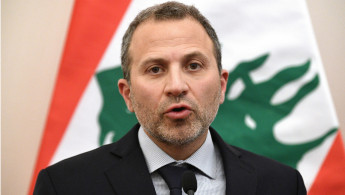World Economic Forum urged to axe 'xenophobic' Lebanese FM Gebran Bassil from Davos panel
Thousands of people have signed a petition in Lebanon urging the World Economic Forum to remove its foreign minister from a debate panel on the Arab Spring, due to controversial comments and policies supported by the Lebanese politician in the past.
Gebran Bassil is set to represent Lebanon as a guest speaker at the World Economic annual meeting, with the theme being titled as: 'The return of the Arab unrest.'
Yet the talk comes amid Lebanon's own "Arab Spring" moment, with protests in Beirut brutally suppressed by government security forces over the past weeks.
Lebanese activists feel that Bassil's role as a minister means that he should not be given a platform to defend the crackdown or speak on human rights issues.
"Since 17 October 2019 and as of date for close to 96 days the Lebanese people have taken to the streets en masse to protest against political corruption, high-unemployment, austerity, sectarianism and a deepening recession among other basic human rights such as lack of stable running water and 24 hour electricity, a crisis the country have experienced for close to 30 years”, the petition said.
The petition stated that Bassil "has been at the centre of all major disastrous decisions that led the country to a political crisis that is likely to bankrupt the country in the not too distant future".
Read more: Why Gebran Bassil is the most reviled politician in Lebanon today
"He has also been linked to squandering of billions of dollars of public funds, money laundering, illicit enrichment of his family members among other ill-fated judgments," the petition claimed.
At the start of the Lebanese uprising, Bassil, who is the son-in-law of President Michel Aoun and leader of the Free Patriotic Movement party, was subject to a popular protest chant "hela hela ho Gebran Bassil… k*** emmo", deemed as an insult.
Economic crisis
Lebanon's protest movement is in part fuelled by the worst economic crisis that Lebanon has witnessed since the 1975-1990 civil war.
The demonstrators have been denouncing rampant corruption in Lebanon and accuse authorities of being inefficient and motivated by personal and partisan gains.
The protests have been met with violence as state security apparatus using disproportionate levels of force against them.
On Saturday alone, 400 people were injured in a violent police crackdown.
The protests this week saw angry demonstrators attack banks following the imposition of sharp curbs on cash withdrawals to stem a liquidity crisis.
Over the past few months, the Lebanese pound - long pegged to the US dollar at 1,507 - has fallen in value on the unofficial market to around 2,500.
The World Bank has warned that the poverty rate in Lebanon could rise from a third to a half of the population if the political crisis is not soon remedied.
Follow us on Twitter and Instagram to stay connected





 Follow the Middle East's top stories in English at The New Arab on Google News
Follow the Middle East's top stories in English at The New Arab on Google News
![Both Hamas and the Palestinian Authority welcomed the ICC arrest warrants [Getty]](/sites/default/files/styles/image_330x185/public/2024-11/GettyImages-2178351173.jpg?h=199d8c1f&itok=TV858iVg)

